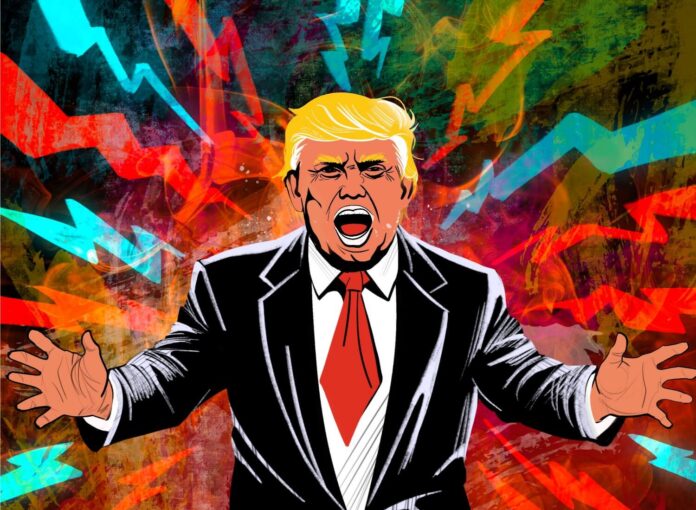As the world watches, the president of the United States threatens allies with military action, slams the world with tariffs and cozies up to America’s enemies. It’s been a tumultuous start to the second Donald Trump presidency. One might think we had elected a madman into office and might be surprised to learn that madman is exactly what Trump is going for.
Originating with Richard Nixon in his dealings with Vietnam and other communist countries during the Cold War, madman theory is the idea that a world leader is able to gain a negotiation advantage in dealings with other countries by portraying themselves as unpredictable, irrational and likely to take aggressive or destructive action. In action, it looks something like last spring when the Trump administration announced tariffs on nearly every country with which the U.S. trades.
In the days following, the administration crowed as many of those countries came to the negotiating table. The original tariff numbers weren’t meant to be final. They were meant to shock countries into negotiation for lower tariffs and trade incentives, to further Trump’s agenda and gain a perceived trade advantage with these countries.
Tariff threats wouldn’t have worked solely on their own merits. Presidents Barack Obama and Joe Biden, for example, would not have found success with such a strategy. During their terms, these presidents went to great lengths to appear reasonable, stand by their allies and maintain the United States’ connection with the world.
But when you put Trump in that position — a man who has called into question the United States’ willingness to support allies, claimed that America would have control of Greenland “one way or the other,” intentionally promotes uncertainty and cultivates the image of a madman who will do nearly anything — suddenly those tariff numbers loom awfully large. That forces nations to the bargaining table.
Since the spring, the Trump administration has signed deals with such important voices as the UK, China and even the European Union to reduce tariffs from the administration’s proposal. For Trump’s purposes, madman theory seems to be working.
Promoting uncertainty in and of itself is not bad policy. For decades, strategic ambiguity has been America’s policy on Taiwan, and for good reason. Commit too strongly towards Taiwan, and the People’s Republic of China is forced to act by what it would see as a growing strategic and ideological threat. Go the other way, and the U.S. loses its credibility as a defender of democracy and as a partner. Unpredictability ensures that Taiwan can continue to largely function as a state, while the People’s Republic of China must plan for a worst-case scenario involving American intervention should it choose to invade the island.
When dealing with an unpredictable entity, countries tend to be more cautious and conservative. They have to evaluate the worst possible response and be prepared for it or else risk disaster. Though it can present a risk in tense situations, in the right context, unpredictability can be an asset.
The way Trump wields unpredictability, however, results in more liabilities than gains. Calling into question America’s commitment to its allies only weakens its position on the global stage. In the case of tariffs, few countries are so dependent on the U.S. for trade that they cannot replace American trade with that of China, Europe or their neighbors, and fewer that will want to cooperate in good faith after being hit with major tariffs. American allies will be less inclined to rely on a country whose president seems so willing to cut ties at any moment.
Take the example of NATO. Trump’s administration has consistently called into question whether the U.S. would commit to defending its NATO allies in the event of an attack. This has led to more recent commitments by all NATO members to spend 5 percent of their Gross Domestic Product on defense by 2035, a great step for an alliance under threat from Russian aggression. But it’s impossible to ignore the words repeated by European leaders: they need to be prepared to fight a war without the U.S. on their side. Clearly, the Trump administration’s policies are killing American credibility with even its closest allies.
Yes, madman theory has achieved some of Trump’s short-term aims. European countries are committed to reaching the capability to defend themselves. America convinced many of its trade partners to agree on higher tariffs than before. However, Trump’s approach has failed to gain anything of note from America’s enemies. Russia, China and North Korea remain hostile and capable, and have made only the smallest concessions, if any. Iran’s nuclear program continues to function. War rages on in Ukraine, Sudan and Gaza.
Trump’s demands ensure that America grows increasingly isolated from its partners as its enemies retain their strength.
Trump and his followers may want that isolation, but they fail to see its logical end: a world dominated by authoritarian countries, with the United States as a declining power, no longer holding the advantages of a world that for so long worked in its favor. Madman theory is best reserved solely for use on America’s enemies, or else relegated to the dusty pages of the history books, lest that reality come true.
Contact Whittaker Perrin at wperrin@oxy.edu
![]()































